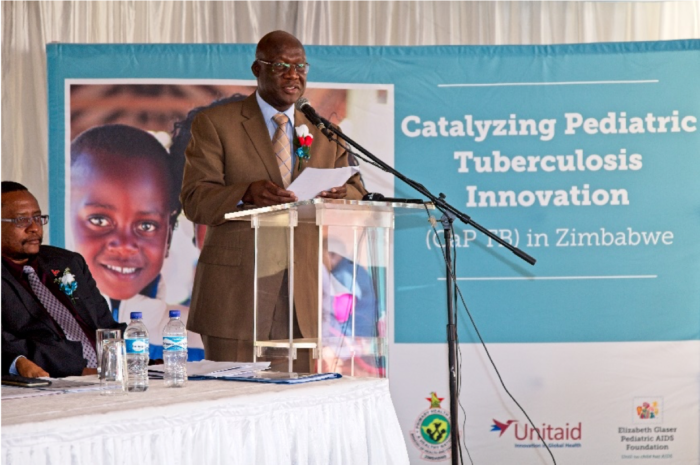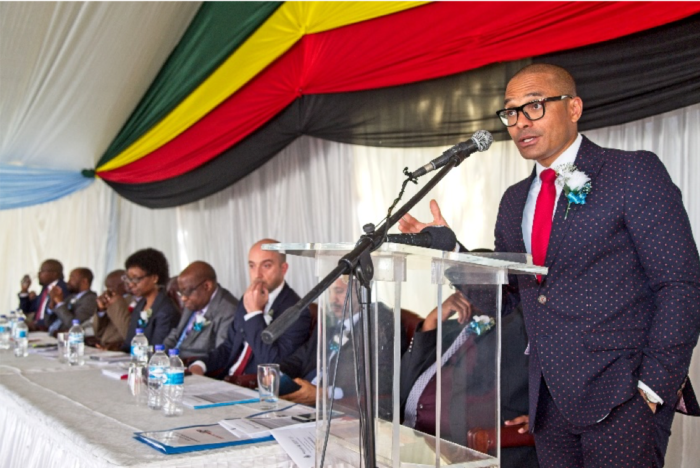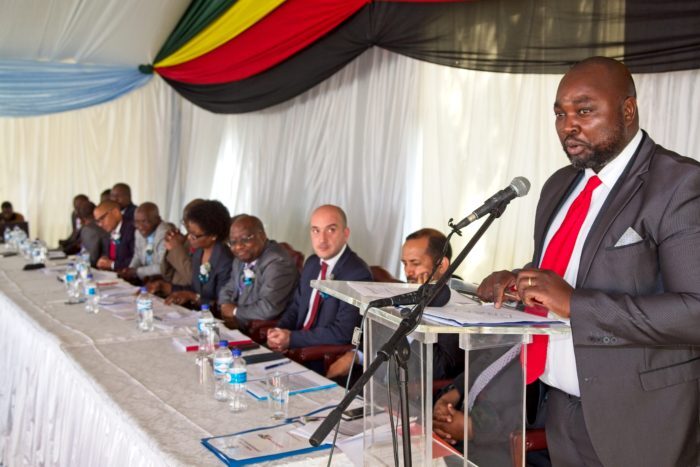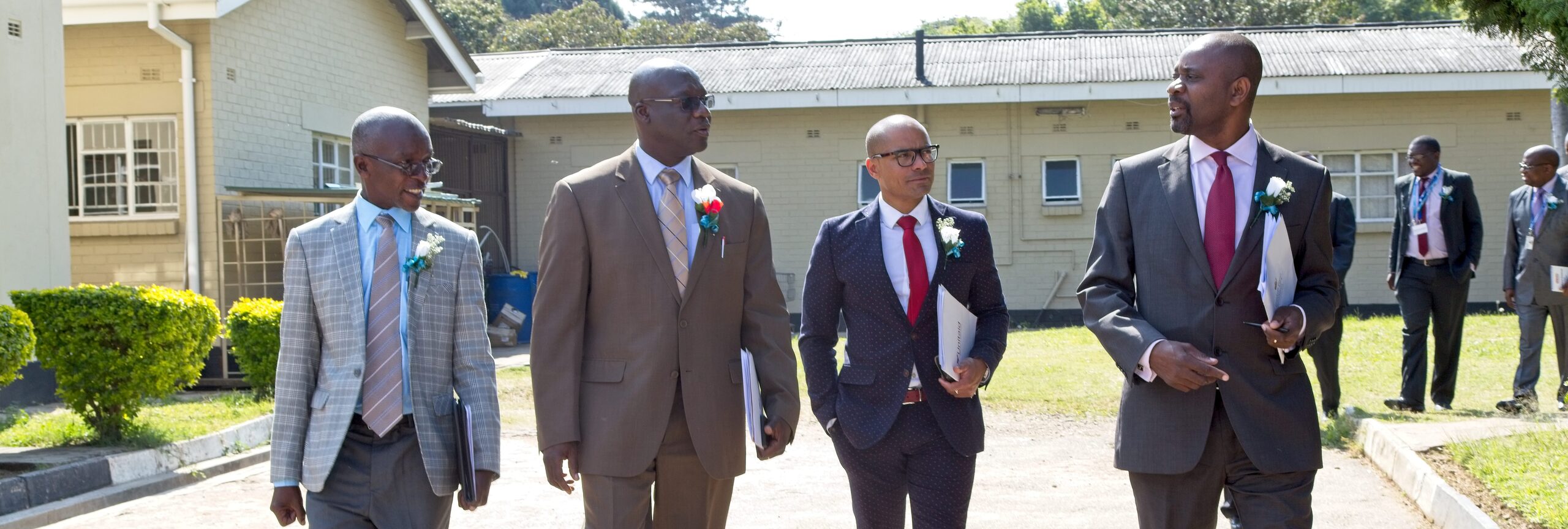The Zimbabwe Ministry of Health and Child Care in partnership with the Elizabeth Glaser Pediatric AIDS Foundation (EGPAF) and Unitaid, recently launched a project to scale-up diagnosis and treatment of tuberculosis (TB) in children.
The four-year Catalyzing Pediatric Tuberculosis Innovation (CaP TB) Project seeks to fight TB in children, a long-underserved group that bears the burden of TB illness and death worldwide. TB, a preventable and curable disease, is the second biggest killer of children in Zimbabwe. The project will optimize better diagnostic tests, easier to take, better-tasting medicines and introduce new strategies for finding children with undiagnosed TB or in need of prevention and retain them in care.

“While we’d expect 10 to 15 percent of TB cases to be children, in Zimbabwe children only represent 7% of the cases reported,” Dr. Charles Sandy Deputy Director AIDS and TB Program said.
“TB in children is often missed or overlooked due to difficulties surrounding diagnosis”, the Health and Child Care Minister Dr. David Parirenyatwa said in a statement read by the permanent secretary for Health and Child Care Ministry (MOHCC), Major General Dr. Gerald Gwinji.

“Achieving the goal of zero TB deaths among children requires sustained advocacy, greater commitment, mobilization of increased resources and a joint effort by all stakeholders involved in providing health care for children and in TB control. We applaud our partners, for bringing this excellent initiative to save children’s lives in Zimbabwe,” Major General Dr. Gerald Gwinji said.
Funded by Unitaid and implemented by EGPAF, the project is expected to double diagnosis of pediatric TB in Zimbabwe, and also greatly increase the number of children who receive appropriate treatment and prevention by introducing innovative models of care, new drugs and diagnostics and build evidence for these innovations to catalyze their scale up.
“Now that we have child-friendly treatment for TB we need to find more children, beyond the city, in the villages, by decentralizing better diagnosis & treatment services. We’re proud to be with Zimbabwe in the cutting edge of innovation to fight childhood TB,” Robert Matiru Unitaid’s Director of Operations said.

CaP TB will be implemented in nine sub-Saharan African countries and India. In Zimbabwe the project is being implemented in Harare, Bulawayo, Beitbridge and Chipinge regions. In the first two years the project will be piloted in 20 sites and an additional 30 sites in the last two years.
“As defenders of children’s health, we at the Elizabeth Glaser Pediatric AIDS Foundation are determined to help the Ministry of Health and Child Care to find and implement innovative and effective solutions in response to the current TB epidemic impact on children and their families,” Dr. Agnes Mahomva, Country Director for EGPAF in Zimbabwe said.
Speaking during the launch of the project at Beatrice Road Infectious Diseases Hospital (BRIDH) in Harare, Dr. Nkhoma standing in for the World Health Organization (WHO) Country Representative said the CaP TB project is catalyzing something that must be scaled up and not just piloted.
“At health facilities, the project will optimize integration of TB screening at all entry points where children access health services” said Dr. Tichaona Nyamundaya Zimbabwe CaP TB project lead.

CaP TB will train community health care workers and nurses to screen TB in children. The project will pilot shorter latent TB infection treatment regimens to improve adherence and treatment outcomes. To ensure children are diagnosed and treated quickly, the project will also introduce use of non-sputum specimen and encourage use of more accurate diagnostic technologies and mobile health technologies to reduce the time it takes to obtain results and retain children in care.
The project will also work closely with the Ministry of Education’s school health program and raise awareness to create demand for childhood TB services. School health masters will be trained to screen children and collect specimens for testing.
CaP TB project will complement Zimbabwe’s health and child care ministry’s efforts of placing digital chest x-rays in districts hospitals by introducing a radiological interpretation mentorship program while working closely with the Pediatric Association of Zimbabwe and private sector radiologists.
France, one of the founding members and major funder of Unitaid, was represented by Mr. Lionel Canny Chargé d’Affaires of the French Embassy. Central and municipal government representatives, UNICEF, World Health Organization (WHO), The Union and the Clinton Health Access Initiative (CHAI) also attended the launch.

“We are pleased to continue our partnerships with the government of Zimbabwe and Unitaid, and are eager to go beyond our work in HIV prevention and treatment services, to address the longstanding challenges associated with identifying and treating TB in children. Through the CaP TB project, I am confident that we can reduce the burden of childhood TB and give Zimbabwe’s children a brighter future,” said Charles Lyons, EGPAF President and CEO.




